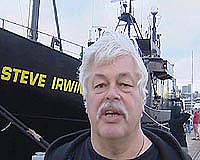| . |  |
. |
Tokyo (AFP) April 23, 2010 A "peace plan" by the International Whaling Commission to legitimise but reduce whaling drew fire Friday as Japan demanded higher quotas and environmentalists warned of serious harm to the ocean giants. The chairman of the 88-nation commission, seeking to end decades of bitter conflict between its pro- and anti-whaling members, unveiled Thursday the compromise proposal to be voted on at a June meeting in Morocco. Under the draft proposal, Japan, Iceland and Norway would reduce their whale kills over the next decade, subject to tight monitoring, with Japan eventually cutting its Antarctic whale culls by three quarters. The IWC said in a statement that the "10-year peace plan" would save thousands of whales and present "a great step forward in terms of the conservation of whales and the management of whaling." But it was roundly criticised by anti-whaling nations and environmental groups, which charged that it would end the moratorium in all but name and risked reviving a dwindling industry in whale meat. Japan now hunts whales under a loophole to a 1986 moratorium on commercial whaling that allows lethal "scientific research" on the sea mammals, while Norway and Iceland defy the moratorium altogether. "It will be a major achievement if, despite some fundamental differences ... countries can put these differences aside for a period to focus on ensuring the world has healthy whale stocks," IWC chair Cristian Maquieira said. Japan reacted by saying it would push for higher cull quotas than those outlined in the proposal. Japan, which now targets more than 900 whales in its annual Antarctic hunts, would have to reduce that number to around 400 whales in the next season and to just over 200 a year from the 2015-16 season onwards. It would also be allowed to catch 120 whales a year in its coastal waters. Fisheries Minister Hirotaka Akamatsu, while welcoming the endorsement of coastal whaling, said: "Regarding the total catch allowed, it is different from Japan's position. We want to continue negotiating with patience." But environmental groups voiced deep concern. "This is probably the biggest threat to the ban on commercial whaling that we've faced since it came into force," said Nicolas Entrup of the Munich-based Whale and Dolphin Conservation Society. Greenpeace said the proposal would reward whaling nations. "It's a bit like a bank robber who keeps robbing the bank. You can't actually catch him, so you decide to just give him a big pile of money," said its oceans campaigner Phil Kline. The World Wide Fund for Nature's species programme manager Wendy Elliott charged that the proposed quotas were "a result of political bargaining which has little if anything to do with the whales themselves." Australia's Environment Minister Peter Garrett said Canberra could not accept the proposal and stressed that "the government remains resolutely opposed to commercial and so-called 'scientific' whaling." In Wellington, Foreign Minister Murray McCully called the catch limits unrealistic and said "New Zealanders will not accept this". "The proposal to include fin whales in the Southern Ocean is inflammatory," he said, pointing at a plan to allow Japan to catch 10 of the animals annually for three years, and five per year after that. The United States, which has helped spearhead the compromise, withheld a final judgment, anticipating further negotiations. "The important thing here is that the IWC isn't working right now," said Monica Medina, the US commissioner to the IWC. "Even with the moratorium in place, the number of whales being killed is increasing and if we can turn that around and decrease the number of whales being killed, that would be a good thing." The compromise would also allow the killing of 870 minke whales a year in the Atlantic, slightly down from the current total catch quotas by Norway and Iceland, along with Japan's continued hunt in the Pacific Ocean. burs/fz/txw
Share This Article With Planet Earth
Related Links Follow the Whaling Debate
 Japan whalers blame lower catch on Sea Shepherd harassment
Japan whalers blame lower catch on Sea Shepherd harassmentTokyo (AFP) April 12, 2010 The last ship of Japan's Antarctic whaling fleet sailed home Monday with the lowest catch in years, a shortfall whalers blamed on high-seas clashes with the militant environmental group Sea Shepherd. The mother ship the Nisshin Maru sailed into Tokyo harbour, the last of the five harpoon ships to come home after they set sail in November, its hull splattered with blood-red paint thrown by th ... read more |
|
| The content herein, unless otherwise known to be public domain, are Copyright 1995-2010 - SpaceDaily. AFP and UPI Wire Stories are copyright Agence France-Presse and United Press International. ESA Portal Reports are copyright European Space Agency. All NASA sourced material is public domain. Additional copyrights may apply in whole or part to other bona fide parties. Advertising does not imply endorsement,agreement or approval of any opinions, statements or information provided by SpaceDaily on any Web page published or hosted by SpaceDaily. Privacy Statement |